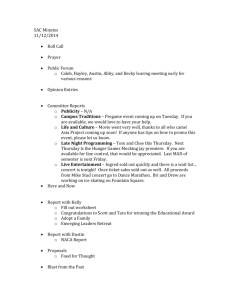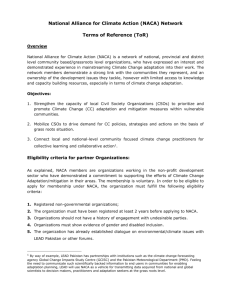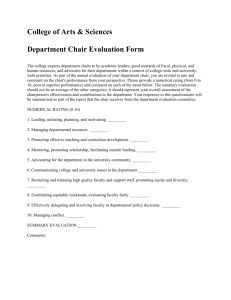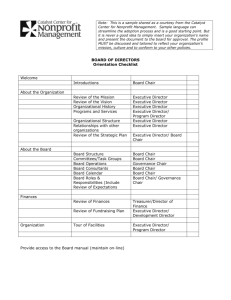Native American Cultural Association
advertisement
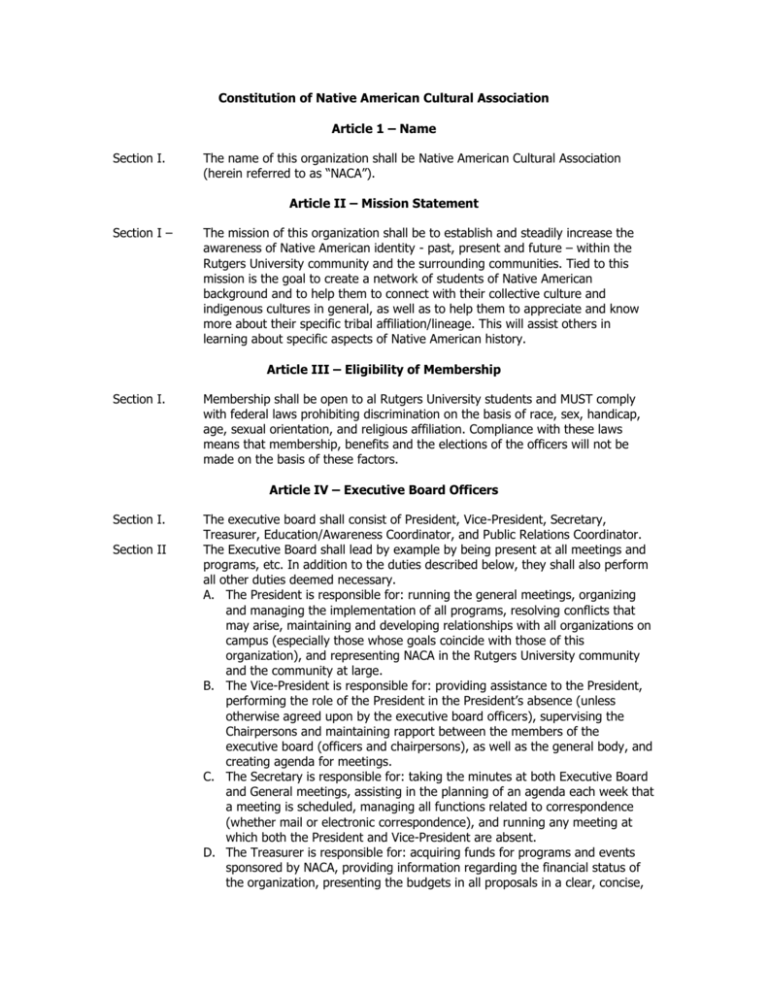
Constitution of Native American Cultural Association Article 1 – Name Section I. The name of this organization shall be Native American Cultural Association (herein referred to as “NACA”). Article II – Mission Statement Section I – The mission of this organization shall be to establish and steadily increase the awareness of Native American identity - past, present and future – within the Rutgers University community and the surrounding communities. Tied to this mission is the goal to create a network of students of Native American background and to help them to connect with their collective culture and indigenous cultures in general, as well as to help them to appreciate and know more about their specific tribal affiliation/lineage. This will assist others in learning about specific aspects of Native American history. Article III – Eligibility of Membership Section I. Membership shall be open to al Rutgers University students and MUST comply with federal laws prohibiting discrimination on the basis of race, sex, handicap, age, sexual orientation, and religious affiliation. Compliance with these laws means that membership, benefits and the elections of the officers will not be made on the basis of these factors. Article IV – Executive Board Officers Section I. Section II The executive board shall consist of President, Vice-President, Secretary, Treasurer, Education/Awareness Coordinator, and Public Relations Coordinator. The Executive Board shall lead by example by being present at all meetings and programs, etc. In addition to the duties described below, they shall also perform all other duties deemed necessary. A. The President is responsible for: running the general meetings, organizing and managing the implementation of all programs, resolving conflicts that may arise, maintaining and developing relationships with all organizations on campus (especially those whose goals coincide with those of this organization), and representing NACA in the Rutgers University community and the community at large. B. The Vice-President is responsible for: providing assistance to the President, performing the role of the President in the President’s absence (unless otherwise agreed upon by the executive board officers), supervising the Chairpersons and maintaining rapport between the members of the executive board (officers and chairpersons), as well as the general body, and creating agenda for meetings. C. The Secretary is responsible for: taking the minutes at both Executive Board and General meetings, assisting in the planning of an agenda each week that a meeting is scheduled, managing all functions related to correspondence (whether mail or electronic correspondence), and running any meeting at which both the President and Vice-President are absent. D. The Treasurer is responsible for: acquiring funds for programs and events sponsored by NACA, providing information regarding the financial status of the organization, presenting the budgets in all proposals in a clear, concise, accurate manner, working in conjunction with the Chairpersons and Programming committees, developing and maintaining relationships with potential sponsors/donors. E. Education/Awareness Coordinator is responsible for: managing the collection of educational materials and resources (contacts for speakers, books, internet research, etc.) that will enlighten members and the general public about Native American culture, creating and taking charge of programs that concern Native American culture. F. The Public Relations Coordinator is responsible for: creating and maintaining networks with media and other organizations in general, increase the RU community’s awareness of NACA’s presence and purpose. Section III. The Advisor of the organization must be a full-time faculty or staff member of Rutgers University. The Advisor must have the rank of Instructor or above. The Advisor shall be a non-voting member of the organization. Article V – Chairpersons Section I. Section II. The titles of the chairpersons are as follows: Community Service, Historian, Latino Student Council Representative and Latino Student Council Alternate Representative, United Black Council Representative and United Black Council Alternate Representative, Parliamentarian, Political Chair, Social/Cultural Chair , Tribal Affiliations Chair, Language Chair, and Dance Chair. The Chairpersons (who are members of the Executive Board) shall lead by example by being present at all meetings, programs, etc. In addition to the duties described below, they shall also perform all other duties deemed necessary. A. The Community Service Chair is responsible for: developing community service programs, acting as a liaison to the Rutgers community at large. B. The Historian is responsible for: documenting all events in which NACA takes part as well as hosting programs that depict NACA’s mission and legacy, organize and execute programs focused on Native American history and living culture as well in conjunction with other chairpersons. C. The Latino Student Council Representative and Alternate Representative are responsible for: ensuring that NACA is represented at each Latino Student Council meeting, informing the rest of NACA as to the information about each Latino Student Council meeting, and informing Latino Student Council about NACA activities. D. The United Black Council Representative and Alternate Representative are responsible for: ensuring that NACA is represented at each United Black Council meeting, informing the rest of NACA as to the information about each United Black Council meeting, and informing United Black Council about NACA activities. E. The Parliamentarian is responsible for: knowing the Robert’s Rules of Order in order to run a meeting, knowing all the information in the constitution, attaining permits needed for any activity. F. The Political Chair is responsible for: raising awareness regarding political issues that concern the Native American/indigenous peoples of America both locally and nationally, organizing and executing programs that address political issues. G. The Social/Cultural Chair is responsible for: developing and organizing cultural events, contributing to fundraising efforts, working with other organizations concerning social/cultural events. H. Tribal Affiliations Chair is responsible for: researching procedures for members to become recognized by their specific tribe, if applicable, or possible, managing research and database of all tribes in North and South America (including the Caribbean area). I. The Language Chair is responsible for: researching and maintaining an information source on languages used by Native American Tribes, creating programs or information sources on current use of language in Native American culture (i.e., conversation and song) J. The Dance Chair is responsible for: creating programs that highlight Native American dances, and, if possible, coordinate a dance performance each year. Article VI – Active Members Section I. Section II. An active member is defined as one who attends 75% of meetings and events held by NACA. Only active members may partake in nomination, election, impeachment and other voting procedures. Article VII. Nomination and Elections Process Section I. Section II. Section III. Section IV. The method of nominations from the floor and self-nominations shall be used to nominate all executive board members for the following year: President, VicePresident, Secretary, Treasurer, Education/Awareness Coordinator, Public Relations Coordinator, Community Service, Historian, Latino Student Council Representative and Latino Student Council Alternate Representative, United Black Council Representative and United Black Council Alternate Representative, Parliamentarian, Political Chair, Social/Cultural Chair , Tribal Affiliations Chair, Language Chair, and Dance Chair. A. The officers will preside over the election and will tabulate the results, unless an incumbent officer is a candidate and in such cases he/she shall not tabulate the results. B. Nominations for the officers and chairpersons should be made at the meeting prior to the elections. C. No executive board officer may hold more than one office at a time. D. If, after the close of the nominations, there are no candidates for a given office, the present Executive Board shall appoint an individual to fill the vacancy with the present memberships’ approval within three weeks of the elections. E. The above-mentioned officers shall be elected by the majority of votes cast by secret ballot. Voter eligibility shall be determined by the most current membership list on file with the Student Activities Center at the time of elections. Membership list updates or additions submitted less than 30 working days prior to the date of the election are not valid for such election. Should a vacancy occur in the office of Presidency, the Vice-President shall assume the duties of the President until the next regular scheduled elections. If the Vice-President cannot assume the duties of Acting President, a special election shall be held to fill the vacancy. A. Impeachment proceedings may be brought against any Executive Board member of the organization by any three (3) active members of the organization. Section V. B. These members must file charges in writing, with all Executive Committee members. These charges must also be filed with the Student Activities Center where chartered. C. The organization must have a special meeting to discuss the charges two weeks from the date where charges were filed. D. Removal from the office requires a 2/3 vote from the voting procedures. E. The Executive Board Member against whom proceedings are brought is granted the following: A “no contest” impeachment if he/she agrees to the complaints raised and attests to this in writing that must be kept in the organization’s file at the Student Activities Center. Automatic impeachment if the Board Member in questions is absent for proceedings, unless a valid excuse is presented within three days (before or after the scheduled meeting. The executive board will determine the validity of the excuse by a vote. F. The Advisor can offer comment but may not vote nor suggest a vote to any member of the Executive Board, not to any general member, regardless of member’s activity status. A. Quorum for an organization with less than 50 members is 50% plus one (1). B. Quorum for any organization larger than 50 members is 25 members or 25% plus one (1), whichever is greater. Article VIII Section I. Section II. Section I. Section II. Special meetings will be held when requested by any of the officers, the advisor, and/or when petitioned by ten percent of the membership. All Executive Board members are permitted three (3) excused absences for executive and general meetings per semester distinctly. Excused absences are deemed so by written notification received prior to the absence. The protocol for unexcused absences will follow a four-tier system. The first unexcused absence will result in a verbal warning, the second a written warning, the third probation, and the fourth unexcused absence will result in request for forced resignation. Article IX – Constitution A. Any active member may propose an amendment to the constitution. A written copy of the proposed amendment shall be submitted to the Executive Board. B. The Executive Board shall give written notification to the membership at the meeting following the receipt of the proposed amendment. This Constitution may be amended by a 2/3’s vote of the membership, provided that the amendment was submitted in writing at a previous regular meeting and notice was given to all members at least on week before the meeting on the constitutional amendment. The amendment will go into effect after it has been presented to and approved by the Student Activities Center where chartered. C. The effects of such an amendment are not retroactive. Questions of parliamentary procedure shall be decided in accordance with forms laid down in Robert’s Rules of Order, latest edition. Article X. Funds Rutgers College requires that all monies (including but not limited to dues, donations, and student fees applications) of student organizations registered at Rutgers College and receiving more than 50% of its funding from Rutgers College must keep its funds in the Rutgers College Student Fund Accounting Office. Otherwise, all monies must be maintained in an account at one of the residential undergraduate colleges where it is registered. Organizations must hold their funds at only one college. Article XI. University Policy This organization shall abide by all applicable laws of the State of New Jersey and the United States. Moreover, this organization shall abide by all applicable rules and regulations of the University and under the privileges granted by the Office of Student Activities, Deans and Dean of Students where chartered. This organization shall also abide by the rules and regulations of the Board of Governors, the university and the Colleges as provided by the Board of Governors and Deans of the Colleges. Article XII – Constitution Renewal Date Section I. Section II. The Constitution must be reviewed at maximum every three (3) years. The next scheduled renewal date will be in May 2005.
